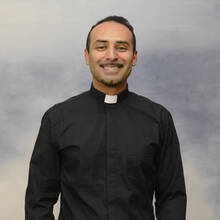Hope for final reconciliation is possible
The adventures of Paul and Barbabas continue in this Sunday’s readings. On their journey, they return only to churches where the word of God had taken hold. Their reflection on this experience speaks volumes about the early communities of faith. Meanwhile, this Sunday’s second reading from Revelation resolves the tension raised in last Sunday’s reading about the gap between heaven and earth.
“He will wipe every tear from their eyes, and there shall be no more death or mourning, wailing or pain, for the old order has passed away.” (Rv 21:4).
How does the encouragement of others play a role in your faith community?
Is there space for prayer and fasting of any sort in your life today?
When was the last time you shared the faith with your community?
Upon their return to these communities, the main task of Paul and Barnabas, as they saw it, was to strengthen the spirits of believers. In the words of Scripture, “They strengthened the spirits of the disciples and exhorted them to persevere in the faith” (Acts 14:22). The apostles faced hardship, but understood it to be necessary, for the many adversities made a disciple like Christ and made it possible to enter the kingdom of God. The two went on to appoint elders to lead communities of faith in Lystra, Iconium and Antioch. The process of appointment included “prayer and fasting” for each moment of election (Acts 14:23). Arriving at each new destination, the two gathered the community to share the faith and learn about the work accomplished so far. “Then they spent no little time with the disciples” (Acts 14:27).
What emerges from this image is nothing less than the fundamental elements of any church community. The work of the apostles to sustain belivers included constant encouragement, prayer and fasting during decision making, gathering the community together and sharing the faith, especially the work being done in the name of the Gospel.
Such a model of community appears radical in our own society today, which often values competition and division. Even parish communities that avoid political polarization can find other ways to tear each other down rather than build each other up. Moreover, I know from experience that pastors are subject to temptations to tear each other down. It is easy to think the worst of another pastor, believing that my Gospel message is the truth while yours is nothing but a distortion. Where is the “encouragement” and the “sharing of the faith” from this Sunday’s first reading?
This Sunday’s second reading, from the book of Revelation, foretells the day when a new creation overcomes the limitations of human understanding. John’s vision even includes a renewed and better heaven. “I, John, saw a new heaven and new earth. The former heaven and former earth had passed away, and the sea was no more” (Rv 21:1). In this vision, conflicts among humans and between humanity and God cease to exist in some final period beyond our understanding. “Behold, I make all things new,” said the one who sat on the throne (Rv 21:5). Jesus is the God who sits on the throne in the very center of this new thing, since there has never been any conflict between the Father and the Son. The Gospel passages for the past several Sundays have taught this very point. “Now is the Son of Man glorified, and God is glorified in him” (Jn 13:31). All divisions will eventually cease and the source that makes this possible is the unity between Father and Son, reflected in their love.
In this new creation, pastors no longer bicker amongst themselves, political camps are reconciled, and even humanity and God will live together in peace. This is our faith and hope. May it come quickly and may we experience even a small glimpse of this new reality in our present adventure of the faith.








